The Mamas Boy Myth

Kate Stone Lombardi
AVERY
a member of
Penguin Group (USA) Inc.
New York
THE
MAMAS
BOY MYTH

Why Keeping Our Sons
Close Makes Them
Stronger


Published by the Penguin Group
Penguin Group (USA) Inc., 375 Hudson Street, New York, New York 10014, USA
Penguin Group (Canada), 90 Eglinton Avenue East, Suite 700, Toronto, Ontario M4P 2Y3,
Canada (a division of Pearson Penguin Canada Inc.) Penguin Books Ltd,
80 Strand, London WC2R 0RL, England Penguin Ireland, 25 St Stephens Green,
Dublin 2, Ireland (a division of Penguin Books Ltd) Penguin Group (Australia),
250 Camberwell Road, Camberwell, Victoria 3124, Australia
(a division of Pearson Australia Group Pty Ltd) Penguin Books India Pvt Ltd,
11 Community Centre, Panchsheel Park, New Delhi110 017,
India Penguin Group (NZ), 67 Apollo Drive, Rosedale,
North Shore 0632, New Zealand (a division of Pearson New Zealand Ltd)
Penguin Books (South Africa) (Pty) Ltd, 24 Sturdee Avenue,
Rosebank, Johannesburg 2196, South Africa
Penguin Books Ltd, Registered Offices: 80 Strand, London WC2R 0RL, England
Copyright 2012 by Kate Stone Lombardi
All rights reserved. No part of this book may be reproduced, scanned, or distributed in any printed or electronic form without permission. Please do not participate in or encourage piracy of copyrighted materials in violation of the authors rights. Purchase only authorized editions.
Published simultaneously in Canada
Most Avery books are available at special quantity discounts for bulk purchase for sales promotions, premiums, fund-raising, and educational needs. Special books or book excerpts also can be created to fit specific needs. For details, write Penguin Group (USA) Inc. Special Markets, 375 Hudson Street, New York, NY 10014.
Library of Congress Cataloging-in-Publication Data
Lombardi, Kate Stone.
The mamas boy myth : why keeping our sons close makes them stronger /
Kate Stone Lombardi.
p. cm.
ISBN: 978-1-101-56109-6
1. Mothers and sons. 2. MothersPsychology. 3. SonsPsychology. I. Title.
HQ755.85L66 2012 2011047483
306.8743dc23
Printed in the United States of America
1 3 5 7 9 10 8 6 4 2
BOOK DESIGN BY KATY RIEGEL
Some names of parents and children featured in this book have been changed to protect their privacy.
While the author has made every effort to provide accurate telephone numbers and Internet addresses at the time of publication, neither the publisher nor the author assumes any responsibility for errors, or for changes that occur after publication. Further, the publisher does not have any control over and does not assume any responsibility for author or third-party websites or their content.
ALWAYS LEARNING
PEARSON
To Michael, Jeanie, and Paul, with love

Introduction

O N A WINTERS DAY some time ago, I fell into conversation with Susan, a woman I barely knew. At the time I had been writing a regional column for TheNew York Times but had recently been reassigned to cover local news. Casually, I mentioned that my son had used a sports analogy to describe the situation.
He told me, Mom, the problem is that theyre playing you out of position. And he got it exactly. Its not that I cant do straight reportingI did that for yearsits just that my strengths lie elsewhere. My son understood my frustration immediately. And he always knows just what to say to make me feel better.
When Susan didnt answer, I got a little nervous, and added, I hope you dont think its odd that I get career feedback from my nineteen-year-old son.
Her response both reassured and surprised me. She told me that she also talked to her son about work regularly. Her son was older than mine, and he often called her on the way home from his own office to rehash both of their days.
But you have to understand, Susan told me. My son and I are particularly close.
Let me flash forward here and tell you that this very phraseMy son and I are particularly closewas one I would go on to hear repeated again and again when I would later interview dozens of mothers and survey hundreds more for this book. Each of these women believed her closeness to her son was unusual, if not unique.
But back on that cold, gray afternoon, I was still dealing with only a sample of two. As we began to discuss our relationship with our sons, the two of uswho had only met that dayslowly began to reveal a shared level of intensity about our boys that stunned us both. Susan talked about how simpatico she was with her son, and how they had the exact same sense of humor. I countered that no one really got me like my son, and how we could intuit each others moods without even speaking. She said that time spent with her son evoked a profound level of tenderness that she didnt experience with anybody else. This precisely described my own experience.
The conversation was far deeper than talking about what good boys we believed we had raised. Sure, we thought our sons were smart, sensitive, and sweet, and like all proud mothers, we adored them. But there was something else going on. We were also talking about a level of emotional connection and a kind of closeness that was usually only associated with mother-daughter relationships.
For a few moments we didnt know what to make of discovering each other. She said she had never before opened up to anybody about the intensity of her feelings or the true nature of the relationship, assuming that what she experienced was only relevant to her and her son, a kind of family secret. Perhaps, Susan speculated, she could talk about it now because her son had left the nest a decade earlier, had gone on to marry, and was himself about to have a child. This, as she saw it, was proof that she hadnt damaged her son by their closeness.
But what struck me the most that day was what happened next. All of a sudden Susan remembered she was talking to a journalist who writes about families and stopped short. Covering her mouth, she blurted, You must never write about what I told you, and you certainly must never use my full name.
I assured her of the latter but found I couldnt promise the former. Because as the conversation continued, I began to feel a psychological wall was crumbling, even as I was catching the scent of a great story. Why had she and I each believed that we needed to keep this precious bond with our sons to ourselves? Why did both of us feel that if we talked about it openly, our feelings would likely have been misinterpreted and we would have been criticized, perhaps harshly?
In fact, we were soon proved correct about our assumptions. Another woman had quietly joined us during the conversation, and after she listened for a while, she said, with more than a tinge of distaste, You two each sound like you are discussing an illicit love affair. Immediately, Susan and I stammered our denialsthere was nothing sexual about our feelings. If anything, it was a kind of maternal tenderness. But clearly, the mother-son relationship was considered suspect.
Next page
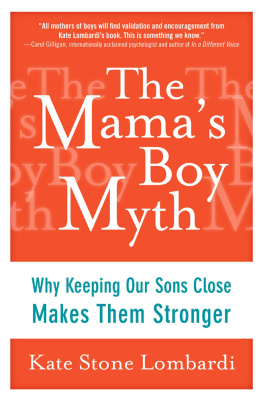
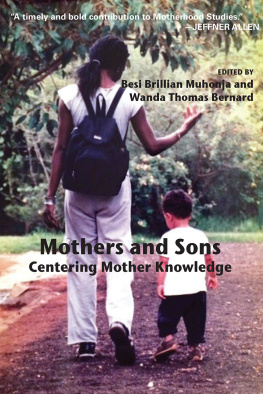
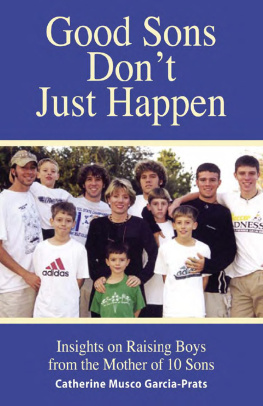

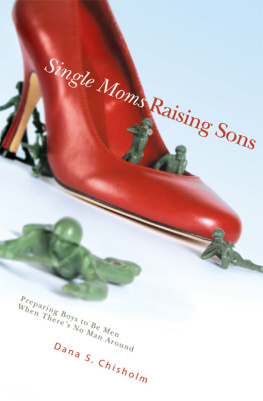
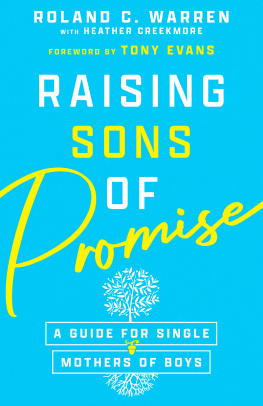
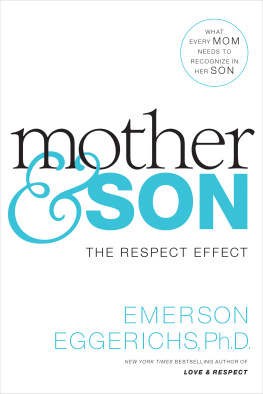
![McDougal - Mothers day: [the shocking true story of a mother who murdered her two daughters with the help of her own sons]](/uploads/posts/book/189824/thumbs/mcdougal-mother-s-day-the-shocking-true-story.jpg)


